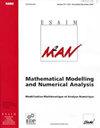Truncation errors and modified equations for the lattice Boltzmann method via the corresponding Finite Difference schemes
IF 1.9
3区 数学
Q2 Mathematics
Esaim-Mathematical Modelling and Numerical Analysis-Modelisation Mathematique et Analyse Numerique
Pub Date : 2022-05-05
DOI:10.1051/m2an/2023008
引用次数: 2
Abstract
Lattice Boltzmann schemes are efficient numerical methods to solve a broad range of problems under the form of conservation laws. However, they suffer from a chronic lack of clear theoretical foundations. In particular, the consistency analysis and the derivation of the modified equations are still open issues. This has prevented, until today, to have an analogous of the Lax equivalence theorem for Lattice Boltzmann schemes. We propose a rigorous consistency study and the derivation of the modified equations for any lattice Boltzmann scheme under acoustic and diffusive scalings. This is done by passing from a kinetic (lattice Boltzmann) to a macroscopic (Finite Difference) point of view at a fully discrete level in order to eliminate the non-conserved moments relaxing away from the equilibrium. We rewrite the lattice Boltzmann scheme as a multi-step Finite Difference scheme on the conserved variables, as introduced in our previous contribution. We then perform the usual analyses for Finite Difference by exploiting its precise characterization using matrices of Finite Difference operators. Though we present the derivation of the modified equations until second-order under acoustic scaling, we provide all the elements to extend it to higher orders, since the kinetic-macroscopic connection is conducted at the fully discrete level. Finally, we show that our strategy yields, in a more rigorous setting, the same results as previous works in the literature.晶格玻尔兹曼方法的截断误差和相应有限差分格式的修正方程
晶格玻尔兹曼格式是一种有效的数值方法,可以在守恒律的形式下解决广泛的问题。然而,它们长期缺乏明确的理论基础。特别是,修正方程的一致性分析和推导仍然是一个有待解决的问题。直到今天,这都阻碍了晶格玻尔兹曼格式的Lax等价定理的类比。本文对任意晶格玻尔兹曼格式在声学标度和扩散标度下的一致性进行了严格的研究,并推导了修正方程。这是通过在完全离散的水平上从动力学(晶格玻尔兹曼)过渡到宏观(有限差分)的观点来完成的,以便消除从平衡状态放松的非守恒力矩。我们将晶格玻尔兹曼格式重写为守恒变量上的多步有限差分格式,如我们之前的贡献所介绍的那样。然后,我们通过利用有限差分算子矩阵的精确表征,对有限差分进行通常的分析。虽然我们提出了在声学尺度下直到二阶的修正方程的推导,但我们提供了将其扩展到更高阶的所有元素,因为动力学-宏观连接是在完全离散的水平上进行的。最后,我们表明,在更严格的设置下,我们的策略产生了与文献中先前工作相同的结果。
本文章由计算机程序翻译,如有差异,请以英文原文为准。
求助全文
约1分钟内获得全文
求助全文
来源期刊

CiteScore
2.70
自引率
5.30%
发文量
27
审稿时长
6-12 weeks
期刊介绍:
M2AN publishes original research papers of high scientific quality in two areas: Mathematical Modelling, and Numerical Analysis. Mathematical Modelling comprises the development and study of a mathematical formulation of a problem. Numerical Analysis comprises the formulation and study of a numerical approximation or solution approach to a mathematically formulated problem.
Papers should be of interest to researchers and practitioners that value both rigorous theoretical analysis and solid evidence of computational relevance.
 求助内容:
求助内容: 应助结果提醒方式:
应助结果提醒方式:


